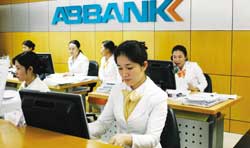Looking for the cutting edge
commercial bank executives in Vietnam claim competition will shift from interest rates to human resources in 2008, a result of wholly foreign-owned and joint stock banks entering the market.
 The hunt to track down talented banking staff will gather momentum in 2008 |
The bank also announced incentives for its customers seeking loans to purchase automobiles, houses and other high-value goods with interest rates of 0.92 per cent per month. Of which, consumption loans were announced to have a maximum value of VND200 million ($12,500).
Southern Bank also launched credit packages for purchasing, repairing homes and consumption lending, of which, credit paid by instalments had a maximum value of VND300 million ($18,000) over 48 months.
High credit growth was the result of rising credit volumes for consumption and property, both of which had credit conditions eased with incentives.
The market had a typical year with competitive deposit and credit interest rates on the back of loosening credit conditions in 2007. Credit growth rates topped 37 per cent on average, far higher than 2006’s average rate of 20 per cent.
Among the big winners, commercial joint stock banks posted three-digit credit growth last year. Commercial joint stock banks secured a quarter of the credit market by the year’s end, up 5 per cent against the previous year. Meanwhile, the market share of commercial state-owned banks reduced by 7 per cent last year.
In the beginning of the new year, the State Bank announced a plan to grant licences to nine new commercial joint stock banks and five wholly foreign-owned banks within the year.
An Thanh Son, executive deputy general director of Vietnam International Bank, said 2008 would be unlike last year with the primary focus of competition being securing skilled human resources.
“The firms that will make a difference in 2008 will be the new commercial joint stock and wholly foreign- owned banks and their search for personnel,” said Son. He added that local banks could see their best and brightest lured away to work for foreign companies.
Competition for human resources has been fierce since 2007 as all local banks have moved to expand their operations.
Nine commercial bank applicants are preparing key structures and personnel to enter the market. UV Bank’s preparation committee is currently focussing on recruitment, training and setting up offices and branches.
The search for prime property is also intensifying banking competition. Since last October alone, close to 20 new branches and banking transaction points opened in Ho Chi Minh City.
“We have basically finished preparations that would allow us to operate,” said Duong Cong Minh, head of the preparation committee at UV Bank.
Bui Thi Mai, general director of the Hanoi Building Commercial Joint Stock Bank, said this year would be difficult for local banks as they competed for customers amid mergers and acquisitions.
“With support from our strategic partners, we will feel more confident about dealing with competition, especially those who are new or have a smaller scale,” said Mai.
Pham Tuan Tu, general director of GP Bank, said foreign banks have yet to secure many transaction points and a small customer base had prevented them from capturing a greater slice of the market.
Foreign banks have a strategic plan to acquire Vietnam’s banks to take advantage of their network transaction points, said Tu. When foreign banks offer their services and a new network, the competition would become more severe, he said.
“It is really difficult for a young bank like us in 2008 to recruit and keep staff, though we have targeted the doubling of our growth rate,” said Tu.
Foreign banks back themselves to offer good facilities and quality services, including fast credit decisions.
“Once foreign banks are allowed to operate widely and establish wide networks, it will be even harder to compete,” said Tu.
What the stars mean:
★ Poor ★ ★ Promising ★★★ Good ★★★★ Very good ★★★★★ Exceptional
Latest News
More News
- Cashless payments hit 28 times GDP in 2025 (February 04, 2026 | 18:09)
- SSIAM and DBJ launch Japan Vietnam Capital Fund (February 04, 2026 | 15:57)
- Banks target stronger profits, credit growth in 2026 (February 04, 2026 | 15:43)
- Vietnam on path to investment-grade rating (February 03, 2026 | 13:07)
- Consumer finance sector posts sharp profit growth (February 03, 2026 | 13:05)
- Insurance market building the next chapter of protection (February 02, 2026 | 11:16)
- NAB Innovation Centre underscores Vietnam’s appeal for tech investment (January 30, 2026 | 11:16)
- Vietnam strengthens public debt management with World Bank and IMF (January 30, 2026 | 11:00)
- Corporate bond market poised for stronger growth cycle (January 28, 2026 | 17:13)
- Vietnam's IPO market on recovery trajectory (January 28, 2026 | 17:04)
















 Mobile Version
Mobile Version